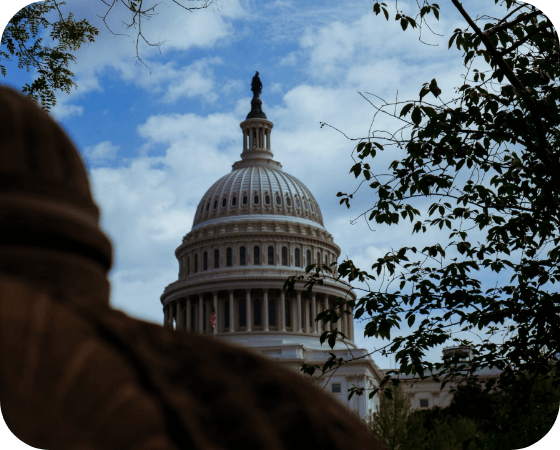Featured Blogs
On May 16, 2024, the House Energy and Commerce Health Subcommittee held a hearing to mark up 23 bills related to a variety of topics, including pediatric cancer and rare disease drug development, telehealth, the nursing home workforce, and Medicaid program integrity.
On May 15, 2024, the House Committee on Education and the Workforce held a hearing about President Biden’s Fiscal Year 2025 budget and other issues within the department’s jurisdiction. Today’s hearing was marked by partisan disagreements about the budget request, recent HHS rules, and the oversight of the Office of Refugee Resettlement.

After a frenzied finish to last week that included a last-minute vote on legislation to reauthorize the Federal Aviation Administration in the Senate, and the bipartisan tabling of the motion to vacate House Speaker Mike Johnson in the House, the Congress reconvenes this week with only 2 work weeks before the Memorial Day break. So, let’s get into it. Welcome to the Week Ahead!
The Administration
Cybersecurity Standards for Hospitals on the Horizon
Deputy National Security Advisor for Cyber and Emerging Technology Anne Neuberger said that the Biden Administration plans to release a rule requiring hospitals to meet minimum cybersecurity standards in response to the Change Healthcare cyberattack in February, according to a Bloomberg News article republished on govtech.com. She also said the administration plans to provide free training to small, rural hospitals who may have trouble meeting the standards.
Will the industry go along? We will be watching how stakeholders in the health care industry react to the news. An article published in the Record notes that Ms. Neuberger has argued that the industry has been asked to address cybersecurity concerns for more than a decade. But these arguments might be a moot point if the industry can find enough sympathy from members of Congress who have not been shy when it comes to pushing back on the administration’s rulemaking authority.
New DOJ Health Care Task Force Joins the Anti-Trust Parade
The Department of Justice (DOJ) Antitrust Division announced a new task force dedicated to addressing concerns about anti-competitive behavior in health care markets. DOJ is also working with the Federal Trade Commission (FTC) and the Department of Health and Human Services (HHS) to extend the comment period for an investigation into how corporate ownership affects health care.
One big question: Will this task force impact voters’ perceptions of Biden’s handling of the economy? As this task force gets going, we know President Biden must be aware of polls such as this one from Gallup that shows him fairing the worst of any president on the question of economic management since 2001. We expect the President to continue to tout his efforts to increase competition and break up trusts – including in health care. But will it be enough to capture the support of November voters?
Bird Flu on the Brain
HHS announced several actions it is taking actions to respond to a recent outbreak of the avian flu (H591) along with the U.S. Department of Agriculture (USDA). The actions announced by HHS to address the avian flu threat do not come cheap. According to the agency, the CDC and FDA investments announced on May 10 will cost more than $100 million.
What we will be watching for: Politico reported on discussions between FDA Commissioner Califf and Ranking Member Hoeven (R-ND) regarding a potential avian flu supplemental funding request. If such a request comes, how will the President handle negotiations with a Republican House that has been skeptical of spending requests and public health proposals from this administration?
The Senate
Schumer Provides Update on AI Legislation
When asked about the specific timelines for AI legislation, Senate Majority Leader Chuck Schumer (D-NY) shared at a recent event that the committees are all over the map:
• Homeland Security, Commerce, and Rules committees are “pretty well along on this.”
• The Senate committees with jurisdiction over health care and education as being “a little further back.”
He said the hope is to have legislation start to come out “within a few weeks throughout the summer and fall.”
Senate Health Hearings
The big hearing this week on health is at Senate Finance Committee entitled “Rural Health Care: Supporting Lives and Improving Communities on May 16. Both the House and Senate committees have been working behind the scenes and with the administration on rural health policy, and this hearing will set the stage for further legislating this summer. Other hearings include:
• May 15: Senate Appropriations Subcommittee on Interior, Environment, and Related Agencies hearing entitled “A Review of the President’s Fiscal Year 2025 Budget Request for Indian Country.
• May 15: Senate Veterans Affairs’ Committee hearing entitled “Frontier Health Care: Ensuring Veterans’ Access No Matter Where They Live.”
• May 15: Senate Homeland Security and Government Affairs hearing to markup legislation, including S.4035, the FEHB Protection Act, which would direct the Director of the Office of Personnel Management to take certain steps to address concerns about improper enrollment in the health insurance program for federal employees.
• May 16: Senate HELP Committee hearing entitled “Examining the Dental Care Crisis in America: How Can We Make Dental Care More Affordable and More Available?”
The House
Ways and Means Continues to Work on Rural
House Ways and Means Committee took the first bite on a rural health package with the markup of telehealth and rural health legislation. Telehealth was the only bill with a bipartisan vote, even though both Democrats and Republicans support improvements to rural health care. Not to be outdone, House Energy and Commerce may be marking up telehealth legislation this week. Both the House and Senate would like to advance rural health legislation ahead of the August district work periods where they can tout legislative accomplishments to their constituents.
Becerra in the Hot Seat….Again
HHS Secretary Xavier Becerra is once again returning to his old stomping grounds in the House when he testifies at a May 15 hearing at the House Education and Workforce Committee. Other House health-related hearings include:
• May 13: House Veterans’ Affairs Health Subcommittee field hearing entitled “Iowa: A Leader in Veteran Healthcare Innovation.”
• May 16: House Oversight & Accountability Select Subcommittee on the Coronavirus Pandemic hearing entitled “Overseeing the Overseers: A Hearing with NIH Deputy Director Lawrence Tabak.”
There You Have It
It’s going to be a busy one! We want to join with those who have come to D.C. to honor our law enforcement officers for National Police Week and Peace Officers Memorial Day on May 15. Be sure to thank a police officer this week for what they do to keep our families and communities safe.
Here’s to a great week ahead – let us know your questions and feedback!
On May 8, 2024, the House Ways and Means Committee held a hearing to mark up six bills related to telehealth and rural health care. These bills included legislation to extend telehealth flexibilities put in place in response to COVID-19, extend enhanced payments for rural hospitals, and create or amend existing rural health care programs.





